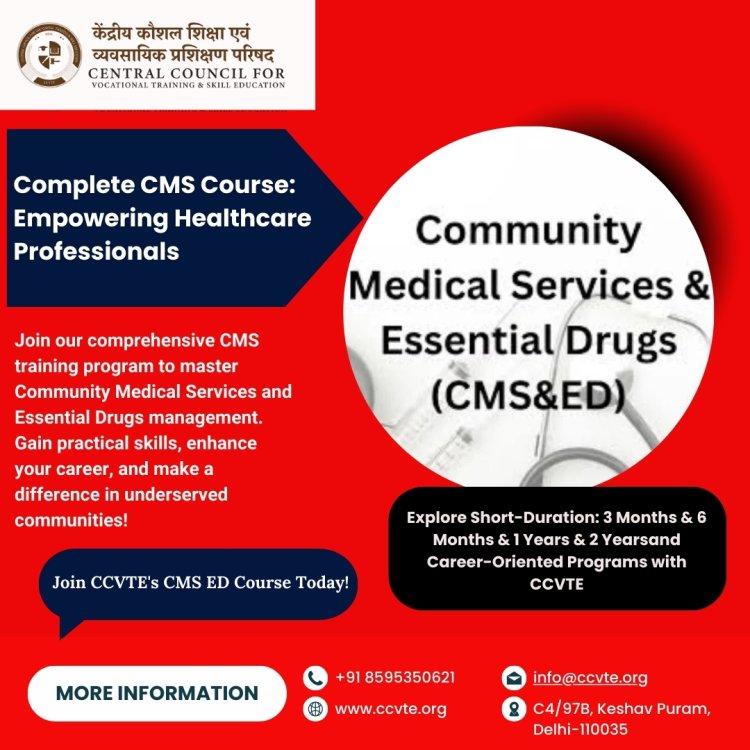Unlock Your Potential with the CMS ED Course: A Complete Guide to Community Medical Services Training

The healthcare sector has consistently been one of the most sought-after industries worldwide, offering numerous career opportunities. For those passionate about making a difference in their community, the CMS ED Course (Community Medical Services & Essential Drugs) stands out as a transformative training program. This guide will explore everything you need to know about the CMS ED Course, its benefits, and how it empowers students through the Central Council for Vocational Training and Skill Education (CCVTE).
What Is the CMS ED Course?
The CMS ED Course is a vocational training program designed to equip individuals with the knowledge and skills to deliver essential healthcare services. It emphasizes community-level healthcare, focusing on primary care, the use of essential drugs, and addressing basic medical needs.
This program is ideal for those looking to bridge the gap between underserved communities and accessible healthcare, especially in rural and semi-urban areas.
Why Choose the CMS ED Course?
Choosing the CMS ED Course offers a pathway to a fulfilling career in healthcare. Here's why it stands out:
1. Comprehensive Training
The curriculum covers essential topics, including anatomy, physiology, pharmacology, and first aid. Students also learn how to administer basic treatments and identify when to refer patients to higher medical facilities.
2. Focus on Community Healthcare
The program is tailored for community healthcare needs, making graduates well-equipped to serve rural and underserved areas where primary care is crucial.
3. Quick Career Start
Unlike traditional medical degrees, the CMS ED Course offers a shorter pathway to entering the healthcare sector. This makes it ideal for individuals seeking a fast-tracked healthcare career.
4. Affordability
The CMS ED Course is cost-effective compared to traditional medical courses, making it accessible to a broader audience.
Eligibility Criteria for the CMS ED Course
To enroll in the CMS ED Course, candidates typically need:
- A minimum qualification of 10th or 12th grade (varies by institution).
- A keen interest in community healthcare and a passion for serving others.
- The ability to commit to the course duration, usually ranging from 6 months to 2 years.
Benefits of Enrolling Through CCVTE
The Central Council for Vocational Training and Skill Education (CCVTE) plays a pivotal role in offering the CMS ED Course. Here’s why choosing CCVTE for this program is advantageous:
1. Skill-Based Learning
The focus is on practical, skill-based training, ensuring that students gain hands-on experience in healthcare settings.
2. Wide Network of Opportunities
CCVTE's affiliation with numerous healthcare organizations opens doors for internships and job placements post-completion.
3. Supportive Learning Environment
The council ensures that students receive high-quality training through experienced faculty and modern facilities.
Key Subjects Covered in the CMS ED Course
The goal of the CMS ED Course curriculum is to give students a comprehensive grasp of community health.. Key subjects include:
- Anatomy and Physiology: Understanding the human body.
- Pharmacology: Knowledge of essential drugs and their applications.
- Primary Healthcare Practices: Basic diagnostic and treatment techniques.
- First Aid and Emergency Care: Managing common medical emergencies.
- Preventive Healthcare: Promoting health awareness in communities.
Career Opportunities After the CMS ED Course
Graduates of the CMS ED Course have diverse career options, including:
- Primary Healthcare Provider: Delivering basic medical care in community clinics.
- Pharmacy Assistant: Assisting pharmacists in dispensing medications.
- Emergency Medical Technician (EMT): Providing pre-hospital emergency care.
- Health Educator: Promoting health awareness and preventive measures.
Why Skill Education Matters?
Skill education courses has become the cornerstone of professional success in today's competitive job market. The CMS ED Course exemplifies how skill-based learning empowers individuals to make meaningful contributions to society.
By enrolling in skill education programs like the CMS ED Course, students gain:
- Practical Expertise: Hands-on training ensures they are job-ready.
- Confidence: Skills learned through practical exposure boost confidence in real-world scenarios.
- Economic Independence: Skill-based courses open doors to well-paying jobs.
How CCVTE Promotes Skill Education?
The CCVTE is committed to promoting skill-based learning through structured programs like the CMS ED Course. Its initiatives align with the government's mission to enhance employability through vocational training.
Advantages of Pursuing the CMS ED Course
Enrolling in the CMS ED Course through CCVTE provides students with numerous advantages, including:
- Job-Ready Skills: Graduates can immediately contribute to healthcare settings.
- Community Impact: The program equips individuals to make a tangible difference in their communities.
- Recognition: Certification from CCVTE is widely respected, enhancing career prospects.
- Continuous Learning: The course lays a foundation for further studies in healthcare.
Conclusion
The CMS ED Course is a game-changer for those aspiring to build a career in healthcare while making a positive impact on their communities. With the backing of the Central Council for Vocational Training and Skill Education (CCVTE), this program ensures students receive high-quality, skill-based training that sets them up for success.
Whether you're looking to start a rewarding career, serve underserved areas, or gain practical medical knowledge, the CMS ED Course is your gateway to achieving these goals.
FAQs
1. What is the duration of the CMS ED Course?
Depending on the school and program design, the course usually lasts one to two years.
2. Is the CMS ED Course recognized by the government?
Yes, especially when pursued through organizations like CCVTE, which provide government-recognized certifications.
3. Can I pursue the CMS ED Course online?
Some institutions may offer online modules, but practical training is usually conducted in-person.
4. What are the job prospects after completing the CMS ED Course?
Graduates can work as primary healthcare providers, pharmacy assistants, EMTs, or health educators.
5. Is prior medical knowledge required to enroll?
No, the course covers all of the fundamentals and is intended for beginners.
What's Your Reaction?





















.jpg)